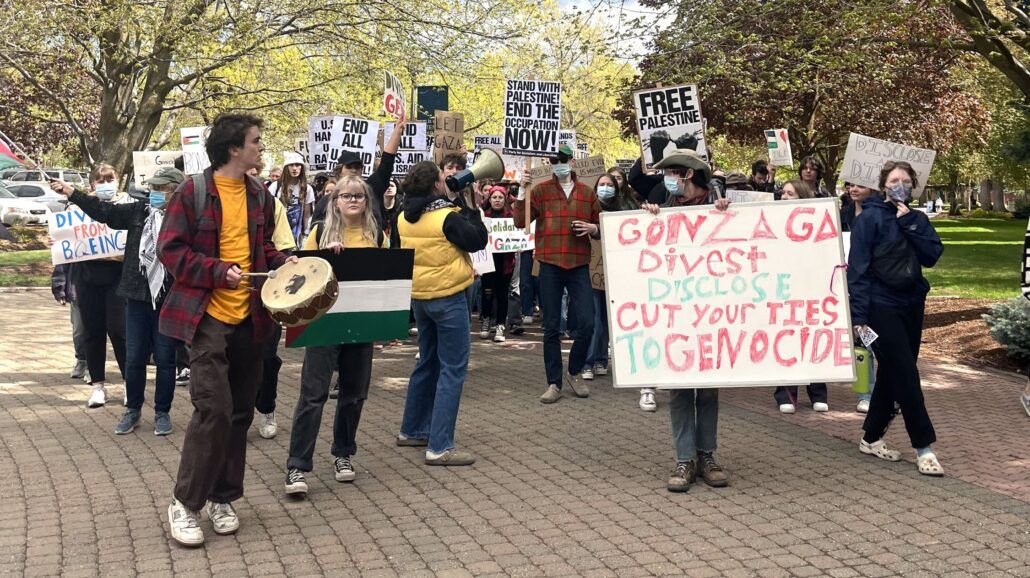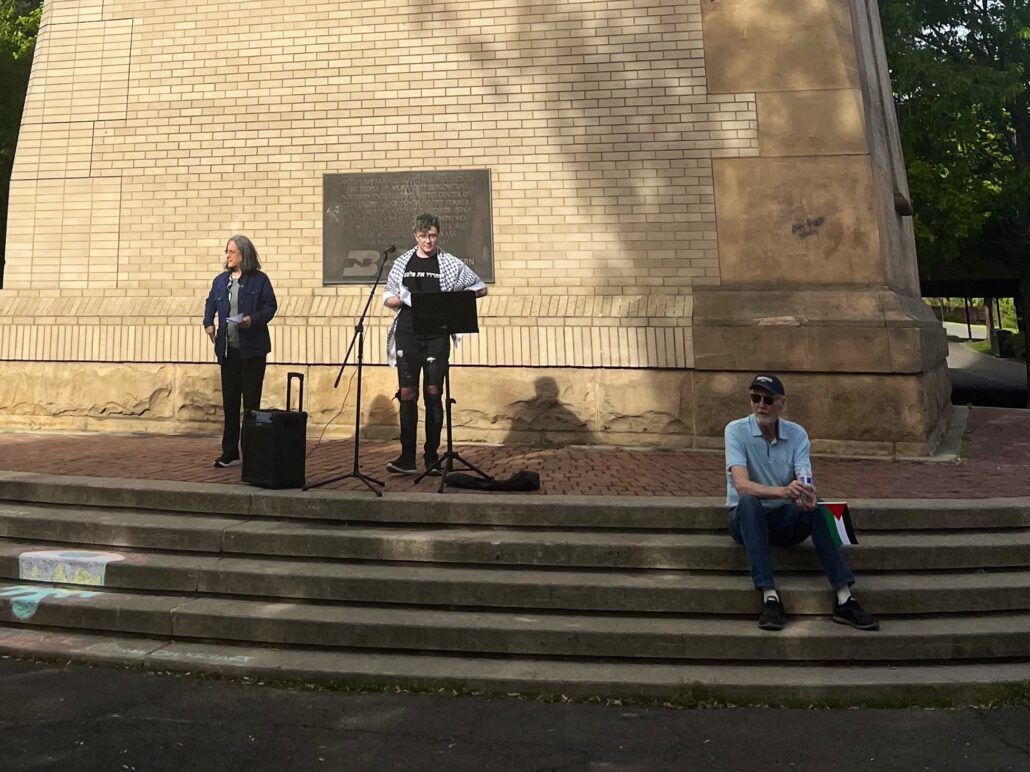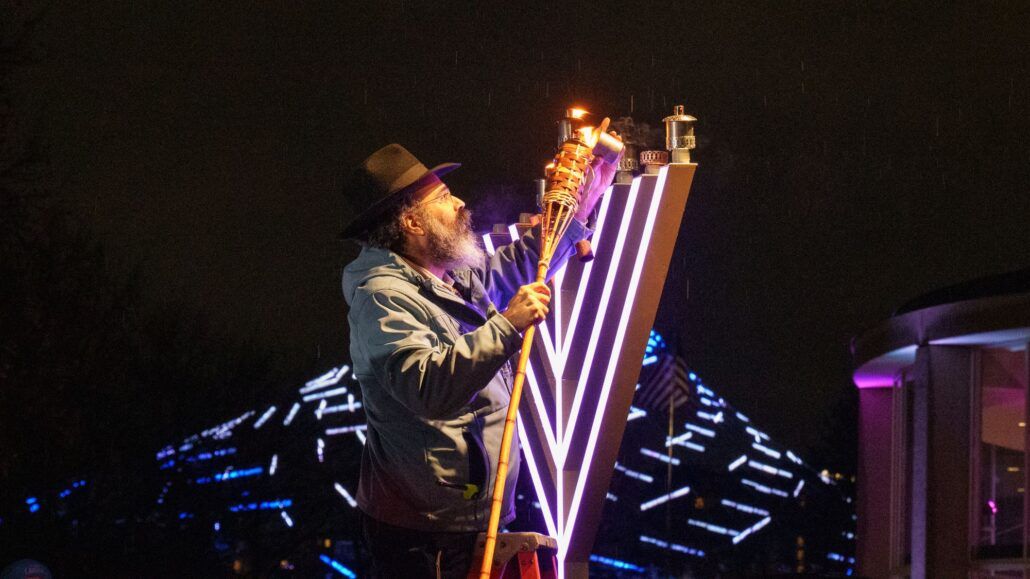Trump’s antisemitism order faces backlash in Spokane
News Story by Lake Lust | FāVS News
The White House’s Jan. 29 executive order detailing measures to “combat antisemitism,” including the investigation of college campuses, has garnered mixed reactions from members of the Spokane Jewish community.
The move comes as Washington state experiences a rise in antisemitic incidents, according to the Anti-Defamation League’s Pacific Northwest chapter (ADL-PNW). Their Feb. 3 report found Washington to be 14th in the nation for number of incidents, citing 189 documented cases in 2023, a 191% increase from 2022.
Some Jewish faith leaders and activists said Donald Trump’s previous responses to white nationalist activity makes it difficult to see his administration as an ally to Jews.
“Most Jewish people don’t take [the executive order] very seriously based on all the things he’s said that are stereotypical, or the fact that he’s communicated with the far-right and has those kinds of people in his circle,” said Jody Shapiro, co-president of Congregation Emanu-El.
Shapiro also co-chairs the congregation’s Responding to Antisemitism committee, which shares anti-bias resources for schools and community organizations around Spokane.
“During Trump’s first presidency, one of the first concerns we heard was the rise of antisemitism that coincided with him running for president and winning,” Shapiro said. “People felt scared in our community about what was happening, and they wanted to reverse that trend. All the organizing we do, we start in our community. That’s where we have the most power.”
Anti-Israel protests can include antisemitism
The executive order has added to a national conversation ongoing since Oct. 7, 2023, when Hamas-led attacks killed about 1,200 in Israel and triggered a major escalation in the Israeli-Palestinian conflict. Israel’s counterattacks, to which the U.S. contributed $17.9 billion the first year, prompted hundreds of protests on college campuses nationwide.
The ADL-PNW report noted that more than 250 anti-Israel protests have occurred across Washington and Oregon since the Oct. 7 attacks.
“Protests and public gatherings often featured support for terrorism and other concerning rhetoric, including explicit antisemitism,” the report stated.
On Feb. 3, the White House authorized Department of Justice probes to investigate five campuses where Jewish students allegedly faced harassment associated with anti-Israel activity. No Washington universities are on the list.
Jewish students need justice and protection
Some Jewish leaders said they are hopeful that Jewish students will receive due justice and protections. Others expressed concern that the order may disproportionately target international students or infringe on freedom of speech, especially when coupled with other recent federal actions targeting diversity, equity and inclusion (DEI) programs.
“It’s ridiculous to say, we’re not gonna have DEI anymore but we’re gonna protect Jews,” said Rabbi Elizabeth Goldstein, associate professor of Religious Studies at Gonzaga University. “You have to take care of minorities, and Jews are a minority. If Trump wants to be myopic about that, it’s going to backfire.”

The protest movement has also highlighted a growing ideological divide among American Jews over Israel. According to an April 2024 study by the Pew Research Center, 45% of Jews under the age of 35 have a favorable opinion of the Israeli government, compared to 54% across all age brackets.
“With any community, you have a wide diversity of opinion,” said Joan Braune, a member of Jewish Voice for Peace – Spokane (JVP) and a lecturer at Gonzaga University. “There’s definitely been a shift, especially with the younger generation of Jewish Americans.”
Not all anti-Zionist protests are antisemitic
While the ADL-PNW has correlated anti-Israel protests with antisemitic incidents, many protests have also been led by Jewish students through organizations such as JVP, which describes itself as anti-Zionist.

Forms of criticism against Israel and Zionism — the movement for the development and protection of a Jewish state in Israel — are exemplified in the International Holocaust Remembrance Alliance’s (IHRA) working definition of antisemitism. The Trump administration cited the IHRA definition in its executive order, but it is unclear how they intend to use it in prosecutions.
“Although I disagree with the IHRA, it was designed to gather data and educate people, not as a legal enforcement tool,” Braune said. “It’s not something designed to then go out and prosecute people or ban things, but the Trump administration absolutely wants to use it that way.”
The IHRA definition has been widely interpreted by advocacy groups to recognize antisemitism. The ADL, for example, adopts it as an educational resource, but warns against using it as a substitute for existing laws. Inland Empire for Israel, a group that advocates for Israel throughout the greater Spokane region, encourages using the IHRA framework to identify antisemitic rhetoric that may be more ambiguous.
“We’ve had antisemitic incidents [in Spokane], but fortunately we haven’t had any violence,” said Mike Barenti, a founding member.
Last year, pro-Israel messages outside Plymouth Congregational Church were vandalized twice.
“Clearly the intention was to intimidate anyone who supports Israel and the right of the Jewish people to exercise self-determination in their homeland,” Barenti said.
Misinformation can fuel antisemitism
Rabbi Yisroel Hahn of Chabad of Spokane said he sees these incidents as linked to not only hatred of Israel, but misinformation about the conflict that could exacerbate anti-Jewish sentiment.

“When you’re comfortable saying things that are not true, to spread lies about Israel, you create the right background that produces this mass antisemitism we see,” he said. “Any bit of info you find, research it. Don’t take any information and accept it as the final truth.”
The JVP Spokane chapter advocates against the IHRA definition. Morton Alexander, a longtime member, has testified against its use to local school boards, citing concerns over freedom of expression when it comes to criticising Zionism.
“In colleges, it seems that a lot of what is called antisemitism on campus amounts to a certain level of discomfort that is experienced by Jewish students who are not ready to deal with this kind of input,” he said. “Jews who speak out on this get a cold reception, but there’s been nothing overt so far.”
Antisemitism must be fought locally and in Jewish solidarity, say leaders
As the first month of Trump’s second presidency concludes, and federal policy continues to change rapidly, Jewish leaders stressed the importance of combating antisemitism locally.
“We have to start including Jewish people in the diversity work we do in schools and businesses,” Shapiro said. “Jewish people belong here. When we’re left out of discussions about diversity, people will believe stereotypes about us.”
Goldstein said that willingness to discuss differing views on Israel could help strengthen the Jewish community.
“I think Jews need to listen to each other a little bit better,” Goldstein said. “This last year and a half to two years has really divided the Jewish community even more than it’s already been divided. I feel like it serves people who hate us to divide us.”








I compare the modern state of Isreal to Abram and Sarai deciding to help God fulfill His promise to them by Hagar conceiving and bearing a child for them.
It has always been human nature to do things for ourselves, or, in this case, help God fulfill His promises. But the result has always been disastrous. To trust God and wait patiently on His sovereign will is NOT our strong suit.
God promised Abraham the land, but took the tribes of Israel to Egypt for 400 years, then delayed their entrance into the “promised land” another 40 years, waiting for them to develop the right character. God did this; not the Jews.
I do not like the way the Jewish Semites have treated the Palestinian Semites, nor the way the Palestinians have reacted to the harsh treatment by the Jews. Both say they trust the God of Abraham but neither side do trust God to bring peace. They believe that they have to fight and kill to achieve peace.
With the benefit of hindsight, the creation of the State of Israel was a mistake. Better to have had a United Nations Mandate to replace the British one. At least, the misery would have been more evenly spread.